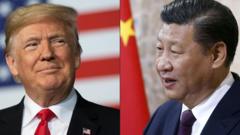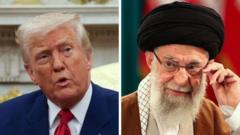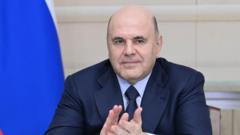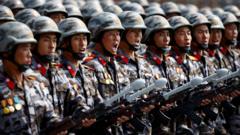Carter's actions not only averted potential conflict but also reshaped diplomatic approaches to North Korea, setting a precedent for future negotiations.
**Carter's Diplomatic Gamble: Averting Nuclear Conflict with North Korea**
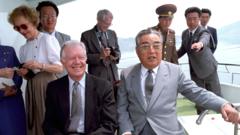
**Carter's Diplomatic Gamble: Averting Nuclear Conflict with North Korea**
Former President Jimmy Carter's surprising visit to North Korea in 1994 played a critical role in de-escalating tensions during a nuclear crisis.
In June 1994, the world stood at the precipice of a nuclear crisis between the United States and North Korea, as fears surged regarding North Korea's nuclear ambitions. Amidst escalating tensions and halted negotiations, former President Jimmy Carter's unexpected visit to Pyongyang offered a glimmer of hope for diplomatic resolution. The trip marked a pivotal moment in U.S.-North Korean relations, leading to a negotiated settlement that promised to curb North Korea's nuclear program.
Carter's journey was prompted by a series of alarming developments, including North Korea's withdrawal of fuel rods from its Yongbyon reactor and its declaration to exit the International Atomic Energy Agency (IAEA). These moves raised U.S. suspicions that North Korea was clandestinely developing nuclear weapons, leading to a breakdown in negotiations and preparations for military action in Washington.
Before his visit, Carter received personal invitations from North Korea's leader Kim Il-sung, who sought rapprochement. Sensing impending conflict, Carter decided to accept Kim's invitation despite the considerable risk involved. "I think we were on the verge of war," he later recalled, emphasizing the potential devastation that a military confrontation could unleash.
On June 15, 1994, Carter arrived in North Korea accompanied by his wife and a small entourage. Unraveling the complexities of diplomatic protocol, he cleverly negotiated with Kim, securing mutual agreements and laying the groundwork for a key deal: North Korea would halt nuclear activities in exchange for assistance from the United States. However, Carter faced significant resistance upon returning to Washington, where officials were critical of what they perceived as "freelancing" and undermining active government policy.
Despite the discord among U.S. officials, Carter's strategic use of media played a critical role in advancing the dialogue between the two nations. He leveraged the press to exert pressure on the Clinton administration, which ultimately shifted its stance toward a more conciliatory approach following Carter's return. The agreement that emerged from this high-stakes negotiation was the Agreed Framework, which successfully froze North Korea's nuclear ambitions for nearly a decade, although it later fell apart in 2003.
Carter's legacy, characterized by a strong commitment to peace and diplomatic engagement, remains complex. While some critics view his actions as a gamble that bypassed established U.S. foreign policy, others commend his courage and determination, viewing him as the catalyst for reducing hostilities on the Korean Peninsula. Looking back, North Korean relations have continued to evolve, underlining the significance of Carter's unprecedented visit in opening channels of communication that still influence diplomatic efforts today.
Carter's journey was prompted by a series of alarming developments, including North Korea's withdrawal of fuel rods from its Yongbyon reactor and its declaration to exit the International Atomic Energy Agency (IAEA). These moves raised U.S. suspicions that North Korea was clandestinely developing nuclear weapons, leading to a breakdown in negotiations and preparations for military action in Washington.
Before his visit, Carter received personal invitations from North Korea's leader Kim Il-sung, who sought rapprochement. Sensing impending conflict, Carter decided to accept Kim's invitation despite the considerable risk involved. "I think we were on the verge of war," he later recalled, emphasizing the potential devastation that a military confrontation could unleash.
On June 15, 1994, Carter arrived in North Korea accompanied by his wife and a small entourage. Unraveling the complexities of diplomatic protocol, he cleverly negotiated with Kim, securing mutual agreements and laying the groundwork for a key deal: North Korea would halt nuclear activities in exchange for assistance from the United States. However, Carter faced significant resistance upon returning to Washington, where officials were critical of what they perceived as "freelancing" and undermining active government policy.
Despite the discord among U.S. officials, Carter's strategic use of media played a critical role in advancing the dialogue between the two nations. He leveraged the press to exert pressure on the Clinton administration, which ultimately shifted its stance toward a more conciliatory approach following Carter's return. The agreement that emerged from this high-stakes negotiation was the Agreed Framework, which successfully froze North Korea's nuclear ambitions for nearly a decade, although it later fell apart in 2003.
Carter's legacy, characterized by a strong commitment to peace and diplomatic engagement, remains complex. While some critics view his actions as a gamble that bypassed established U.S. foreign policy, others commend his courage and determination, viewing him as the catalyst for reducing hostilities on the Korean Peninsula. Looking back, North Korean relations have continued to evolve, underlining the significance of Carter's unprecedented visit in opening channels of communication that still influence diplomatic efforts today.









